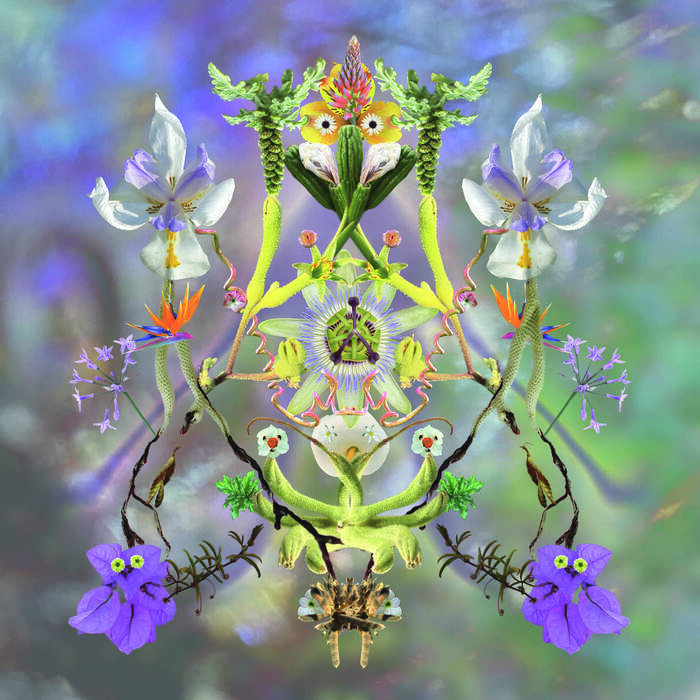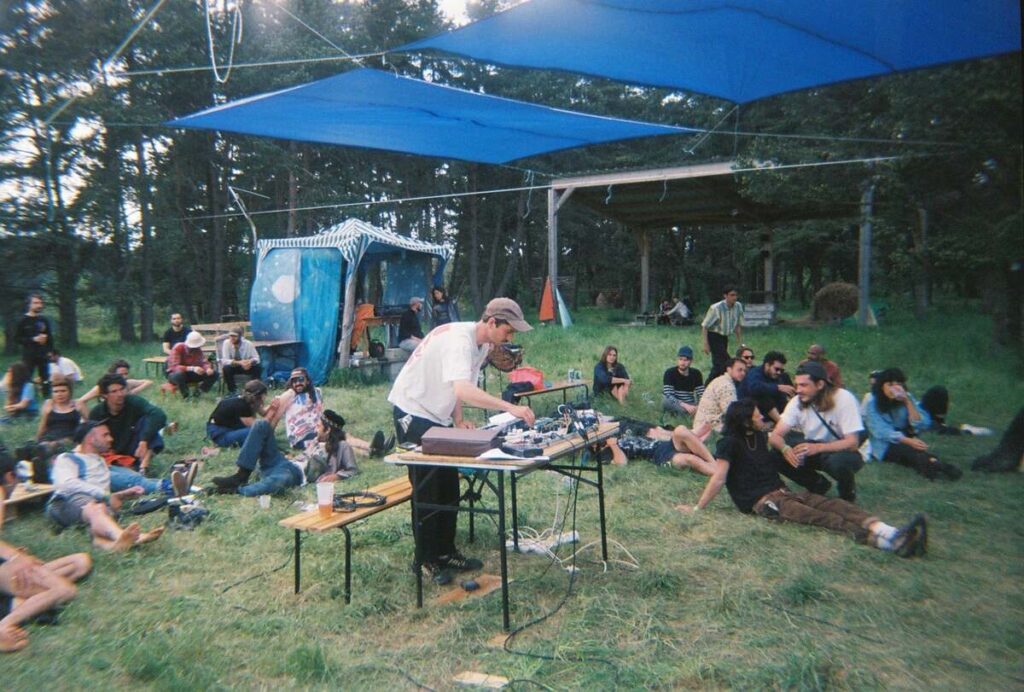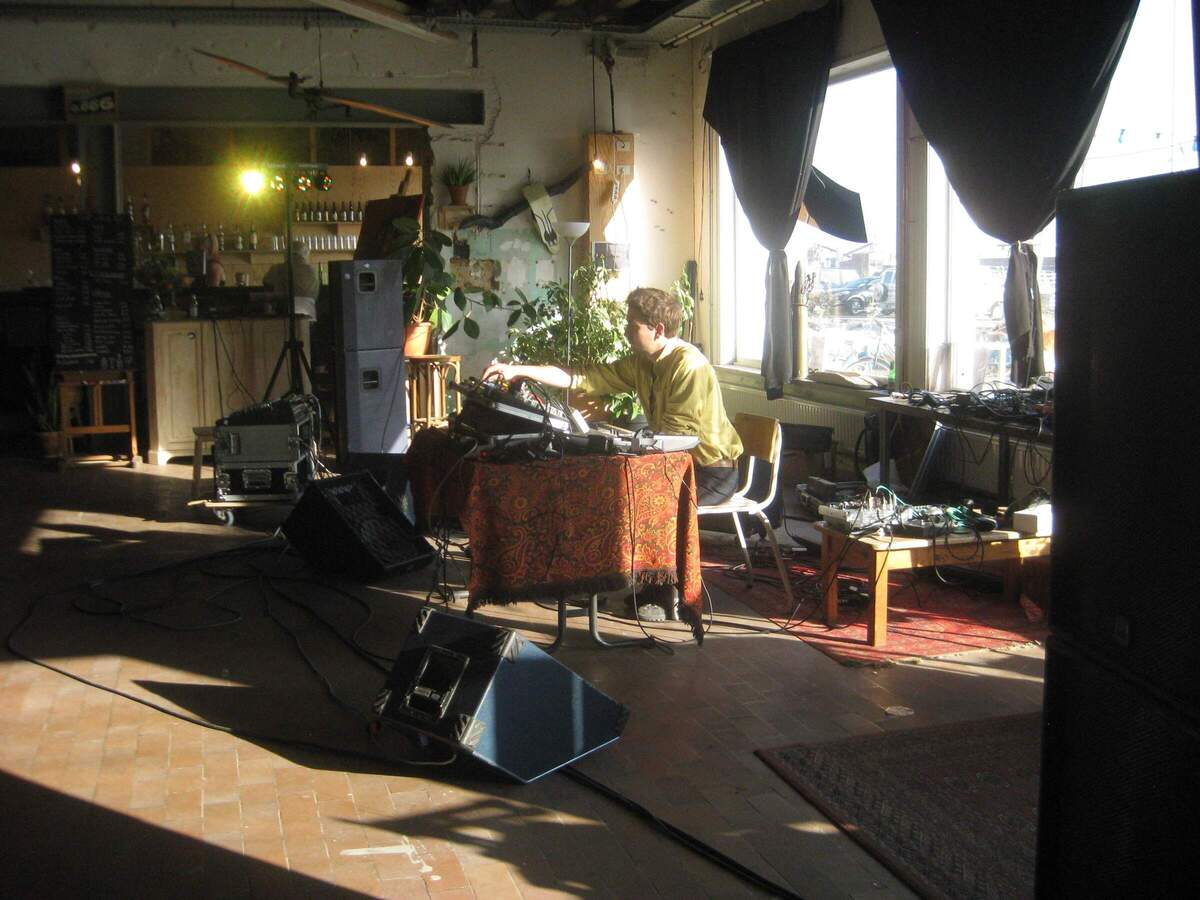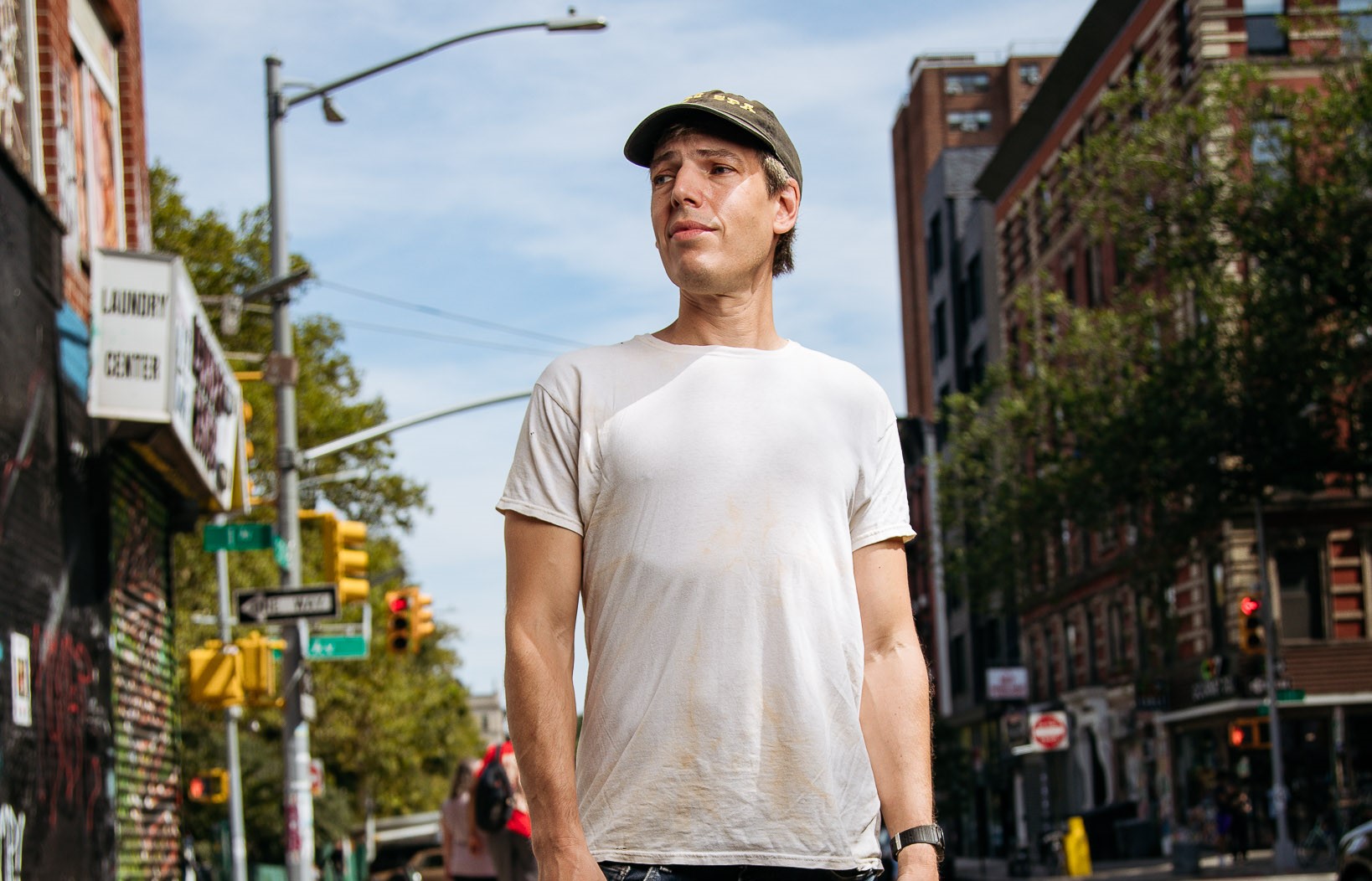Maibaum | Interview | New Album, ‘Sumer Is Icumen In’
‘Sumer Is Icumen In’ is Quentin Thirionet’s (Dhavali Giri, Pairi Daeza) debut album. Despite this, his musical ventures are vast and varied, based almost entirely on improvisation and live recordings, which he occasionally distributes as tapes without further information.
Elusive to categorization and identification, and unwilling to fix his musical activity under a stable pseudonym, his projects have ranged from gypsy jazz guitar swings and French traditional songs from Auvergne to various experimental collaborations. Increasingly inclined towards electronic instrumentation, he crafted “Maibaum,” his first solo output. As the title suggests, this may be a maypole around which his multicolored sonic visions dance.
A former rope access worker and currently a farmer of organic greens, Thirionet brings the essence of these professions into his music. He assembles a subtle balance between high manmade structures and soft, fertilized soils; like a high voltage pylon placed in a biotic landscape. It’s an even blend, spontaneous and steady, born from profound considerations.
Armed with nothing more than a black box, a sequencer, a freeze pedal, and a tape player, Thirionet orchestrates a vivid rite of polished futures. At times reminiscent of Hans-Joachim Roedelius’ enveloping arrangements, Maibaum’s ambiances rely on mild repetitive patterns subsequently textured by prickling sprouts, mechanical dislocations, and revamps that stoke and brighten the stirring motions. Jim O’Rourke comes to mind regarding its detailed and prismatic nature, but ‘Sumer Is Icumen In’ has its own unique narrative. It’s a tale of regeneration, of spring’s delicate processes and allure, and a celebration of the harmonious junctions between nature and machinery.

“The images that emerge while composing are sometimes an echo of strange states”
While preparing for this interview, I could not find any other interviews with you, so can you start by introducing yourself to me? What’s your real name? How old are you? Where do you live?
Qoté Thirionet: Hey there! My name is Qoté Thirionet, I’m 32, and I’m currently moving from Brussels to the center of France, to a region called Les Monts de la Madeleine. I’m starting a medicinal plants farming and processing activity. I used to work in factories and buildings as a rope access worker, but I couldn’t handle the physical strain anymore. For some years, I’ve been studying plants, permaculture, and ecology for this project, so I’m super excited to begin this new life, finally closer to nature and care. Besides work, I play music, run a tiny label and distro called Echotope, and organize concerts in different venues in Brussels.
If I were to ask you: what am I listening to when I listen to ‘Sumer Is Icumen In’, what would you reply? What kind of album did you want to make with ‘Sumer Is Icumen In’? What does the title mean?
‘Sumer Is Icumen In’ is the title of an old medieval English song celebrating the beginning of summertime. The singers mimic the cuckoo bird in polyphony; it’s lovely. You can hear this song in the movie The Wicker Man, which I like a lot. This title resonated with me as an echo to paganism and traditional folk music. The fact that it is in old English, close enough to modern language to ring a bell without being fully understood, intrigued me because it could appear as a weird alien language and create a science-fiction approach to the music. I really enjoy this mysterious dance with the borders of time and perception. It’s also an echo to Maibaum, which is the German name for an ancient ritual to celebrate springtime by bringing a tree to the center of the village to dance around. We find very similar practices worldwide in May, and I like this seasonal universality.
While recording this album, I was mainly guided by the imagery of rituals and ceremonies from strange civilizations. Some happy party times celebrating resistance, some intimate care spells, some empowering dances, harvest songs, love emanations, mystic field recordings, and unidentified marks of cultural manifestations. I envisioned this music as if a future archaeologist discovered the recordings in old ruins, trying to figure out what kind of creature it could be from. The way I composed the tracks was not especially guided by this “vision,” but it helped me to interpret a unity between them, some sort of scenario. I hope it’s the image the whole thing creates—a mix of cyber-bio-magic-seasonal-resilience-pagan incantations.
Can you tell me how you made this record? Can you describe the recording process? Do you play everything yourself? Do you play and record at home?
The process of recording was pretty hard. It’s something I never really practiced before. I felt more comfortable as a live musician than a studio recorder. The tracks were composed to be played live, and that’s how I recorded them. I played them several times until they were “good” enough to capture on an 8-track recorder in my bedroom. Then I sent everything to Nicolas Carcavilla for mixing. He did an amazing job considering the super low-quality materials he received from me. I owe him a lot. My friend Matthieu Reynaud did the mastering.
‘Sumer Is Icumen In’ is released by three labels simultaneously. Why? Is it purely for practical reasons, like having distribution in Europe, the US, and South America?
Tomas Dittborn, who runs the label Nonlocal Research with Nicolas Carcavilla and Siet Phorae, proposed releasing my music and helped me overcome my struggles throughout the process. Tomas and Siet also helped me a lot. They have a partnership with Grant Corum from Psychic Sounds, co-releasing records they all like. I moved from France to Belgium to be closer to a music scene that is highly represented by Kraak Records. I played at their festival with a band called Dhavali Giri, another time with a duo called Pairi Daeza, and as a solo artist. So I felt close enough to propose that they participate in the release, and they agreed. I don’t really understand how it happened, but Gabi, Dylan, and Tim have been very supportive since I arrived in Belgium. I thank these friendly cuties so much. I guess Kraak, Nonlocal Research, and Psychic Sounds were already pretty close, as it’s not the first time they co-produce a record. And of course, it’s pretty cool to spread music over three continents!
The album is available on vinyl. Is it important to you that there’s still a physical object?
With Echotope, I spend a lot of time crafting objects—tapes, zines, CDs, books. I really enjoy making precious personal artifacts that carry a lot of feelings. I also collect records, and it’s a material I really like to touch, see, and feel. Vinyl offers significant space for visuals. Tomas and I exchanged many ideas and concepts for the cover, and he did an amazing job that I absolutely love. Vinyl is probably the most sustainable way to perpetuate sound and memory. The title of each track is actually a reference to things I’ve learned or encountered and want to remember. It’s a way to not forget. I think it’s important to leave all these kinds of traces for future times. Archiving things from people I like is something I’ve been doing for some time now. With this release, it’s finally the occasion to do it for myself.
Because this is for a magazine called “It’s Psychedelic Baby,” do you see your music as ‘psychedelic’? And what would your definition of “psychedelic” be? Do you see your music as ‘esoteric’? Is there a connection to new age?
Of course, I see “my” music as psychedelic because it transfers me into a particular state when I play it. The images that emerge while composing are sometimes an echo of strange states I’ve experienced through dreams, emotions, or “guidance.” When I improvise, I’m always amazed by the reminiscences that appear from sounds and music I’ve heard from others. I feel so glad to carry this memory, to invoke and honor it. Somehow, I know music has always had this mysterious effect. Through it, we all carry the memory of the world, maybe even future and alternate worlds, which brings its batch of hallucinations and different perceptions. This is a pretty new age and esoteric way of thinking, I guess, which makes me laugh because I actually don’t have a clue about what’s happening in the cosmos, and I’m pretty okay with that.

What’s your setup like? A sampler, analog synth, effect pedals, a mixing desk? Do you work analog or digital, or a mix of both?
My setup consists only of electronic devices, which was brand new to me when I made this album because I used to play clarinet, piano, banjo, guitar, flutes, and homemade instruments. Since then, I mix both analog and digital. The machines used for this music are a QY70, an old cheap sound module that I really like to manipulate, controlled by a Keystep keyboard. The samples and loops are recorded and played by a 1010 Blackbox device, which acts as a mini-DAW. I also use a freeze pedal that I activate to create countermelodies while playing the keyboard. Sometimes I also play a cyber-flute, a sort of wind synthesizer.
Joeri Bruyninckx
22/06/2024: Maibaum + Chillera + Roxane Métager, Brussels | More info here
Mailbaum Official Website / Facebook / Instagram / Twitter / Bandcamp / YouTube
Nonlocal Research Bandcamp
Psychic Sounds Bandcamp
Kraak Website




